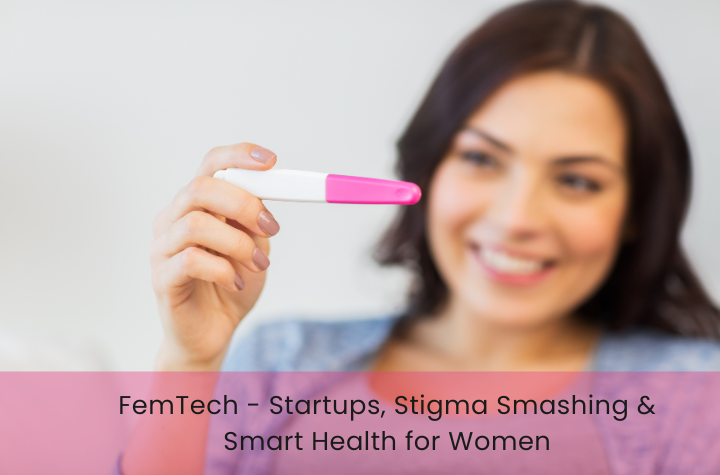Wellness , Business
FemTech Revolution in India: Startups, Stigma Smashing & Smart Health for Women
Discover the growth story of FemTech in India, how the FemTech Startups are revolutionizing women’s health in India, and their opportunities and challenges.

Before the dawn of FemTech, she was smiling and serving, without complaining. No one gave thought to her needs or what she was going through. This physical, menstrual, sexual, mental health neglect led to further problems such as risk of serious illnesses, such as depression, osteoporosis, arthritis, cardiovascular disease, etc, besides other significant physical and emotional issues. And this long-standing neglect triggered a growing awareness around women’s health needs. As a result, a new wave of technology-led solutions is beginning to take shape, giving rise to the FemTech industry.
Globally, the femtech industry is projected to surpass $103 billion by 2030, according to Allied Market Research. While still emerging, the India FemTech space is growing at 18% CAGR and is expected to touch $3.87 billion by 2030. With 650 million women population, rising internet access, and shifting conversations around taboo topics, the shift is being further driven by rising smartphone penetration, the push for personalized digital health solutions, and the rise of women-centric innovation.
Femtech startups in India are tackling everything from period care to menopause support, often combining technology with community-building, and these are led by women and forward-thinking male founders with equal resolution.
What is Femtech?
Ida Tin, a Danish entrepreneur and the co-founder of Clue, the women's menstruation-tracking app, coined the term FemTech.
Femtech, short for “female technology,” refers to tech-enabled products and services designed to address women’s health and wellness needs. These provide solutions for common women-specific problems such as menstruation, fertility, menopause, sexual health, pregnancy, and chronic conditions like PCOS or endometriosis, plus certain diseases that affect women more adversely, such as osteoporosis, cardiovascular, thyroid, arthritis, breast and cervical cancer, etc.
Globally, FemTech is attracting serious attention — U.S. and European femtech startups have raised billions in funding, with leaders like Clue, Ava, and Flo gaining mainstream traction. Now, Indian startups are carving out their own space, building culturally relevant, tech-forward, and stigma-breaking solutions. According to Tracxn, India has 423 FemTech startups, second only to the United States, which has 1,164.
Why Now? Key Drivers Behind FemTech’s Growth in India
• Smartphone penetration is enabling access to menstrual tracking, fertility tools, and virtual consultations in tier-2 and tier-3 cities.
• Gen Z and millennials are more open to discussing taboo topics like periods, PCOS, and sexual wellness.
• Social media and women influencers are helping normalize conversations and boost FemTech adoption.
• Personalized care is replacing one-size-fits-all solutions, with AI and telehealth playing pivotal roles.
From PCOS management to menopause care to women's health nutrition, meet top Indian FemTech startups using technology to solve real problems in women’s health.
Top Femtech Startups Transforming Women’s Health in India
1. Gytree – Co-founded by Shaili Chopra and Swarnima Bhattacharya(2014)
Gytree is a tech-enabled health platform helping women manage chronic hormonal conditions like PCOS, thyroid imbalance, and fertility challenges. Combining AI, teleconsultations, diagnostics, and a preventive care model, it’s redefining what accessible, stigma-free health looks like. Gytree partners with hospitals and educational institutions to bring care to women across age groups.
“Most women don’t know what normal feels like,” says Dr. Ghosh. “We help them decode their health data — without shame.”
2. Sirona – Founded by Deep Bajaj (2014)
Sirona became a household name by addressing real, unspoken problems — from unhygienic public toilets to period struggles. Its menstrual cups, pee funnels, and intimate hygiene products disrupted a stagnant category and brought period care into mainstream retail and e-commerce.
With a strong innovation pipeline and candid messaging, Sirona continues to lead the hygiene conversation in both urban and semi-urban markets.
3. Inito – Founded by Aayush Rai and Varun AV (2017)
Inito is a smart at-home fertility monitor that uses a smartphone-connected device to track multiple hormones with lab-level accuracy. Think Fitbit meets fertility care.
Now shipping to 120+ countries, the startup is popular in India and the U.S. alike. Their core mission? Empowering women to better understand their hormonal health, whether or not they’re trying to conceive.
4. Nua – Founded by Ravi Ramachandran (2017)
Nua began as a customized sanitary pad subscription platform but has evolved into a holistic period and wellness brand. It now offers intimate hygiene solutions, UTI care, and more, all backed by clean design and science-backed messaging.
With $7.1 million in funding and a user base of over 300,000 women, Nua is a digital-first brand with a bold voice. “It’s not just about better products, it’s about better care,” says Ravi.
5. Elda Health – Founded by Suman Gopalan and Shuchi Khurana (2021)
Elda Health focuses on midlife women’s wellness, addressing menopause, heart health, bone density, and lifestyle disorders. The platform offers at-home tests, personalized coaching, and mental health support.
With over 50,000 women served and a fast-growing community of “menopause circles,” Elda is bringing visibility to a long-ignored demographic.
6. MyAvni – Founded by Suhani Mohan and Kartik Mehta (2018)
Avni began with the idea that period dignity is a right, not a luxury. Offering eco-friendly cloth pads, biodegradable menstrual products, and educational programs, it combines sustainability with affordability.
Avni has led India’s first mobile “period literacy” workshop series across schools and low-income communities. Recognition includes multiple social enterprise awards and recent angel funding.
7. Welldium – Founded by Dr. Karan Khurana (2022)
Welldium is a mental and sexual wellness platform for young adults, offering anonymous consultations, discreet STI testing kits, and access to certified sexologists and psychologists via app.
Its millennial-friendly branding and chat-based support system have made it popular across metros and colleges. “Wellness means more than yoga,” says Dr. Karan. “We normalize what others won’t talk about.”
The Bias Challenge: Why Women Founders Still Struggle
Even in FemTech — a sector built around women’s needs — bias runs deep. Female founders often face awkward investor meetings, limited funding, and intrusive questions. Topics like menstruation and sexual wellness are still deemed "uncomfortable" by many VCs.
Dr. Ishita Ghosh of Gytree puts it bluntly: “Convincing male VCs that period pain is serious? It takes twice the data, and twice the persuasion.”
Beyond funding, women founders also carry the burden of educating consumers and destigmatizing health conversations — work that’s invisible, but critical.
What’s Next: The Future of FemTech in India
Femtech 2.0 in India will go beyond menstruation and fertility. Emerging focus areas include:
• Menopause care and egg freezing solutions
• AI-powered personalized health plans
• Sexual therapy and LGBTQIA+ inclusive health platforms
• Partnerships with schools, hospitals, and workplaces
Investors are warming up too — $60M+ was invested in FemTech in 2024 alone, per YourStory Insights.
With the right ecosystem support, Indian FemTech startups have the potential to not just serve local users but export innovation globally, especially in menstrual health tech and digital wellness platforms.
Conclusion: This Is India’s Femtech Moment
From menstrual dignity to fertility empowerment, India’s FemTech founders are not just building startups — they’re shifting mindsets. Led by both visionary women and men, these brands are tackling the real, messy, and often ignored aspects of women’s health.
Femtech in India isn’t niche anymore — it’s necessary, bold, and here to stay. The future? Inclusive, tech-powered, and unapologetically women-first.
RELATED ARTICLES





.png)




-min.webp)

.webp)
![cover-67-How_to_build_your_digital_profile[1].webp](https://thewoomag.com/backend/images/blogs/cover-67-How_to_build_your_digital_profile[1].webp)
I-221, 4th Floor, Hilton Drive Avenue, Sec-50, Gurgaon, 122018, Haryana
info@thewoomag.com
+91-8586970572